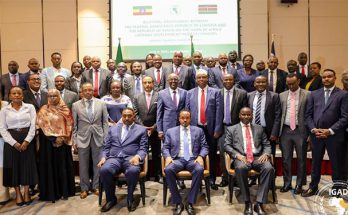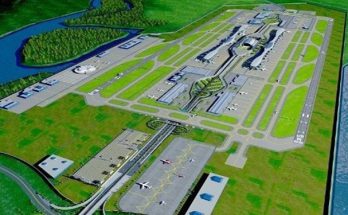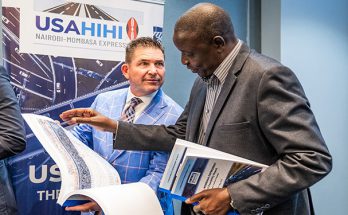 All is now set for the takeoff of the newly established Development Bank of Nigeria (DBN). The bank which was inaugurated by the former president, Good luck Jonathan on Monday March 22, 2015 have among other objectives:(1) to eliminate all obstacles hindering the growth of Micro, Small and Medium Enterprises and their ability to generate the needed jobs for Nigeria (2) to alleviate the financial constraints being experienced by operators of small business for rapid and sustainable development (3) to boost socio-economic activities across the country as it would guarantee long term funding for the MSMEs. The bank is expected to commence with a startup capital of $1.5bn, which is expected to increase to $5.0bn in the medium term and reaching the $10bn mark within the next 10 years.
All is now set for the takeoff of the newly established Development Bank of Nigeria (DBN). The bank which was inaugurated by the former president, Good luck Jonathan on Monday March 22, 2015 have among other objectives:(1) to eliminate all obstacles hindering the growth of Micro, Small and Medium Enterprises and their ability to generate the needed jobs for Nigeria (2) to alleviate the financial constraints being experienced by operators of small business for rapid and sustainable development (3) to boost socio-economic activities across the country as it would guarantee long term funding for the MSMEs. The bank is expected to commence with a startup capital of $1.5bn, which is expected to increase to $5.0bn in the medium term and reaching the $10bn mark within the next 10 years.
These are all lofty dreams which all hands should be on deck to achieve. Thegovernment said that the bank was also set up as a private sector driven wholesale financial institution aimed at increasing access to finance for Micro, Small and Medium Enterprises (MSMEs) through some eligible financial intermediaries. The bank as an interventionist effort by the Federal government to scale up the operations of Micro and Medium enterprises through provision of loans at a single digit.
The good thing about the new DBN is that the shareholders are diverse. Therefore, government will not have monopoly in decision making and staffing. Other shareholdersand partners of the bank include the African Development Bank (AFDB)and KFW Entwicklungs Bank of Germany. The technical skills of these other shareholders/partners will certainly ensure the success of DBN.
In ensuring the success of DBN, I expect the newly inaugurated management staff to ensure that only high-caliber people, knowledgeable in areas of micro and development finance are brought on board. The success of any organization lies in the quality and caliber of its human resources. There should not be compromise in the quality of staff.
Most government agencies and parastatals have failed to live up to its expectation because of quality of human capital at its disposal. Government should not have any hand in sourcing for the technical personnel to man sensitive post in this new outfit. Government interference in hiring process will likely lay the foundation for failure of this new bank.
I implore the government to allow the technical partners in this Special Purpose Vehicle (SPV) have a smooth run on the bank. These partners and shareholders are not new comers in development finance. AFDB and German Development already have a track record of performance and I expect them to bring their expertise to bear in the running of the Development Bank of Nigeria.
Good corporate governance and risk management structure should be well entrenched. History of bank failures in Nigeria always points to two things: weak corporate governance and inadequate risk management structure. If these are not of the highest standard, the bank will collapse before our very eyes.
The bank’s function should not stop at whole sale disbursement of loan to partner institutions who will now lend to MSMEs. I expect the bank to be directly involve with loan disbursement to beneficiaries and monitor the utilization of such facilities.
Adequate mechanism should be put in place to ensure that only qualified MSMEs with scalable operations can access the fund. Consultants could be hired to help MSMES with business proposals that are bankable and technical assistance in book-keeping and products design.
Provision of technical assistance on export opportunities for MSME: Nigeria MSMEs are simply too docile. They hardly explore opportunities in the international market. This could be due to inadequate technical skills to understand the operations of international business and how to access the international market. This is where DBN will be expected to play a significant role in organizing seminars and technical sessions for these MSME operators. They need to be trained on product packaging and branding. Superior product packaging and branding are the bedrock to attracting foreign buyers. I was surprised to see how Kenya goods were flooding the European Union member states.
The MSMEs operators in Kenya packaged their products in an attractive manner that met all international standards. They got tremendous support from the Development Bank of Kenya in achieving this great fit. The work of DBN should not stop at loan disbursement. There should be a deliberate effort in following up with the products that comes from these MSMEs operations and how those products end up. They should be trained on how to improve on their products to make it more marketable across borders. The MSMEs operators should be made to broaden their market base and earn foreign exchange which will be good for the country in general.
A lot of work will be required in this regard by DBN especially in engaging consultants and technical experts that will support MSMEs in their production processes and packaging. As I earlier mentioned in one of my article on improving the non-oil revenue, Nigeria have not explored the benefit in the Africa Growth and Opportunity Act (AGOA) initiated by the US government in a bid to encourage Africa manufacturers to export goods to the US at a zero-duty rate. Most Africa countries like Kenya, Ghana, Cote d’ivoire have all benefited from this act and earned reasonable foreign exchange in return.
Nigeria’s case is pathetic as some of products coming from Nigeria did not meet the international standards. AGOA allows duty free goods to US when it meets certain criteria especially in product quality and packaging. As usual, most Nigeria manufacturers thought that they were producing for local consumption and compromised quality. The result was non-acceptance of some of the exports from Nigeria and as such, could not benefit from the AGOA act. DBN will need to work hard on this area to ensure that beneficiaries improve on the quality of their output and assist them in accessing the international market.
Collaboration with sister agencies involved in MSME funding: There should be a collaboration with agencies of government involve in MSME funding to allow for synergy and prevent gaming the system by the MSMEs operators. Other organizations and schemes like the Small and Medium Enterprise Development Agency (SMEDAN), Small and Medium Enterprise Credit Guarantee Scheme (SMECGS) of CBN, Bank of Industry (BOI), Small and Medium Industries Equity Investment Scheme (SMIEIS) of CBN, Chambers of Commerce and the Nigeria Export Promotion Council (NEPC) should work with DBN to ensure that only the MSMEs with scalable operations access their respective funding opportunities.
The collaboration will prevent some predator MSMEs from accessing multiple funding opportunities from these agencies, while some will not be able to access because of insufficient funding. There should be a mechanism of monitoring MSMEs that have accessed any of the government intervention. This will reduce the incidence of round tripping by some scrupulous MSMEs. The mention of NEPC is very key as the collaboration is needed to help with accessing export potential for MSMEs. Export is not only peculiar to big companies. Small companies do export but the products must meet the minimum international standards and that is where DBN must partner with NEPC.
Creation of MSME big zones to identify those MSMEs with potential for scalability: The zones I have considered as big with huge potentials for scalability are the Lagos, Ogun, Aba, Nnewi, Kano and Kaduna zones respectively. DBN should focus on these zones in the first instance to see MSMEs with potentials for growth and export. Collaboration will be needed with the respective states government in this regard. I still don’t know while the Aba shoe industry have not been able to access the European and American market successfully. This is one area DBN should focus on and see how to assist the artisan in improving their products to make them marketable overseas.
This will earn the country huge foreign exchange. Countries like Vietnam, Bangladesh, India, Mongolia and some South East Asian countries have improved their locally manufactured goods tremendously.
The development bank in those climes played a key role in getting their products to the international market. Left to the artisans and local tailors, they would not be able to do that as they do not have the capacity both in terms of funding and knowledge of export market. Go to Primark and other mega stores in UK and see shoes and clothing from Bangladesh and Vietnam. I expect to also see shoes in these mega stores abroad proudly written, ‘Made in Nigeria’.
In conclusion, loan disbursement alone will not guarantee success for DBN. The management of the DBN and its partners should not use the number of MSMEs that have accessed funding as a yard stick of their success. This has been the case with CBN, BOI and SMEDAN. They always shun figures of number of MSMEs that have successfully accessed their funding opportunities as a yard stick of their success in MSME intervention. Let it be on record that Development Bank of Nigeria and its partners will be assessed by the number of MSMEs that are able to scale up their operations significantly, hire more hands, improve on their product finishing and able to access the export market.



